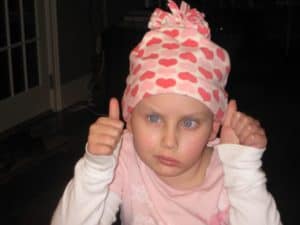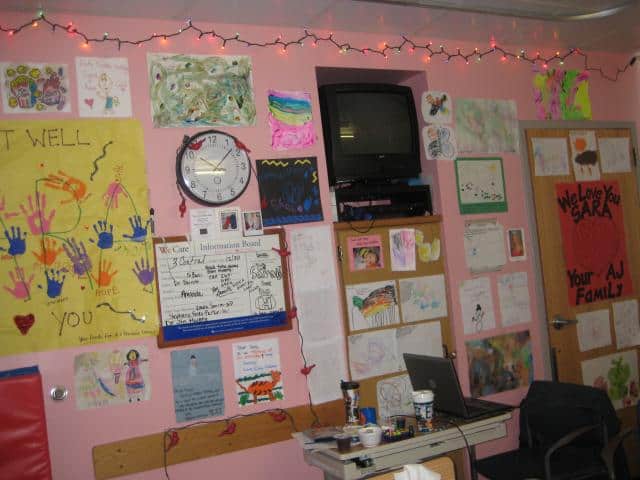by Jennifer Burke
July 7, 2007. I looked up at my 4 year-old, Sara, on stage during her camp play. She made an adorable Munchkin, but when my eyes met hers I couldn’t wait to whisk her off the stage. Something was wrong. Her left eye was crossed and I could no longer concentrate on the show. When the curtains finally closed and campers were dismissed, we grabbed a celebratory water ice as we dashed off to the doctor’s office. I was worried that perhaps she may need an eye patch for what seemed to be a lazy eye. Worry turned to panic as the doctor shined her penlight into Sara’s eyes and sent us directly to the hospital for an MRI.
As we waited for Sara to emerge from the MRI, our pediatrician told us we would probably be placed on the oncology floor. Oncology?! My teeth began to chatter and nurses brought me blankets to help quell my shaking. Sara was diagnosed with medullablastoma, a malignant brain tumor. It felt as though someone had punched us in the stomach and then dropped us on a different planet. At the time, we had no idea that we would not return home from the hospital for seven months.
Planet Cancer had new lingo, practices, procedures, and equipment. The sights, sounds, smells and information were scary and overwhelming. It required all of our energy and attention. Time spent keeping family and friends informed was time spent away from Sara and made me anxious. I was grateful when a social worker introduced to me a website, carepages.com, on which I could blog and share with everyone at once the events of each day.
I appreciated Carepages for the opportunity to share the details of our journey (as this was a time before social media blossomed), but I quickly learned that the value of the blog lay not merely in my ability to share, but in the ability to connect with our audience of loved ones. Friends and family were able to share responses and that simple connection bridged the physical gap between us. That connection gave us the strength we needed to face the incessant challenges of each day.
Cancer patients are often isolated for long stretches of time due to their compromised immune systems caused by chemo. Away from the comforts of one’s own home, surrounded by beeping machinery, and continually probed by doctors and nurses, it is easy to feel scared, alone, and even forgotten. I am eternally grateful for the fact that Sara never experienced that fear and loneliness. From the moment family and friends learned of Sara’s illness, they showered her with cards, drawings, and posters. Encouraging words flowed to us on our Carepage. Messages of love plastered our walls until our foreign, unfamiliar hospital room became a warm, personal source of hope and strength. Even the nurses enjoyed hanging out in our room!
We were lucky to have visitors whenever it was permitted. Family members played with Sara, her pre-school teachers read stories to her, and friends brought special treats. Sara felt so closely connected to her home environment that when the new school year began without her, she still felt every bit a part of the class. Despite her frequent and lengthy bouts of isolation, Sara felt the love and support that poured forth from all those that knew her and even many who did not. It made all the difference in how she approached each day. Rather than withdraw and succumb to sadness and trepidation, she awoke with hope, determination, and cheer, asking every morning, “What are we doing today?” She was ready to fill the day with activity, trying valiantly to stave off cancer’s plans.
Sara’s personality played a great part in how she managed her illness, but a great part of her strength (and mine) came from the love and compassion of others. The mitzvah of visiting the sick, Bikkur Cholim, is essential for patients in keeping their spirits up and feeling connected to their community. In many cases, as often was ours, visits in person may be impossible but it is not the physicality that is important. It is messages such as “I love you.” “You are not alone.” “You are stronger than you think.” These words carry great power, no matter the manner in which they are delivered.
My daughter passed away the day after Mother’s Day in 2008, surrounded by dozens who loved her. I have great pain, but I have tremendous peace of mind in knowing that Sara knew just how much she was loved. It is the expression of that love that transformed her experience and continues to keep my heart afloat today.

Jennifer Burke is the founder of Sara’s Smiles Foundation. The mission of Sara’s Smiles is to foster a more positive environment and upbeat experiences for children who are diagnosed with cancer by providing a variety of resources to entertain, comfort, and educate. For more information about Sara’s Smiles please visit www.saras-smiles.org.




